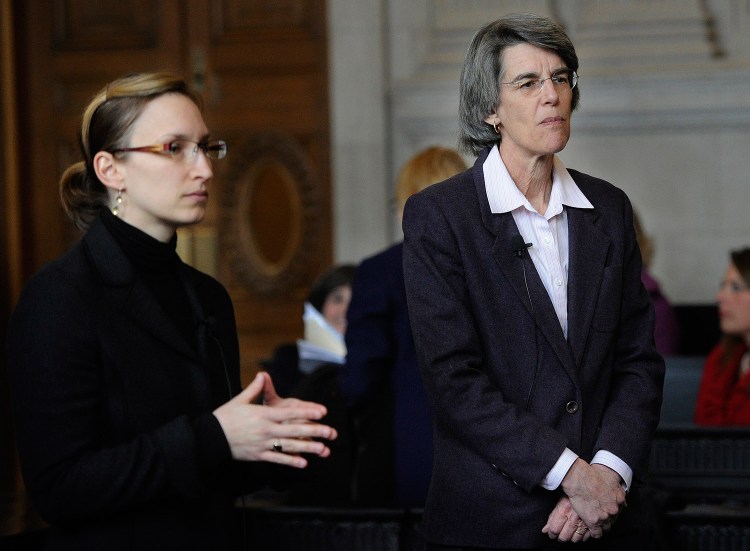Justices on Maine’s highest court boiled down an ongoing dispute between Republican Gov. Paul LePage and Democratic Attorney General Janet Mills to a matter of money.
The Maine Supreme Judicial Court heard oral arguments Thursday from attorneys for the two sides as the governor asks whether he can hire private attorneys without the attorney general’s permission when she opts not to represent the administration.
“Money talks. The person who controls the purse strings controls the litigation,” said Justice Ellen Gorman, one of five members of the panel of judges who heard arguments.
The judges’ questions quickly focused on whether the attorney general can impose caps or cost estimates on how much the governor can spend on private attorneys, or whether that limits the private attorneys’ ability to act in an unfettered and uninfluenced manner, as required by law. Mills has refused to represent LePage in two cases over his efforts to curb welfare, because she didn’t believe the cases had legal merit.
The judges, however, may decide not to get involved in the dispute. The governor filed a letter to the court last month with a “request for opinion,” a formal action that would require the judges to find the situation constitutes a “solemn occasion” before they issue a legal ruling.
The court adjourned Thursday after the 40-minute proceeding without indicating whether it will take up the case or decline.
In one of the two cases in which Mills declined to represent the governor, Mills joined litigation opposing the governor. In that case, LePage is fighting the federal government to eliminate Medicaid coverage for about 6,000 low-income young adults in Maine.
In that case in particular, LePage’s administration contends that Mills overstepped her legal authority by setting a cost estimate of how much the governor could spend, requiring the governor’s staff to check in with the attorney general every time they neared a spending threshold.
“What the Attorney General’s Office is having us do is come back over and over and over for continuing permission to use outside counsel. So it’s not just permission at the outset. They are placing limits on the duration of the period of the retention agreement with the lawyer and the amount of money that can be spent,” argued LePage’s senior health policy adviser, attorney Holly Lusk.
But Assistant Attorney General Phyllis Gardiner, who argued Mills’ position, said her office only imposed a spending cap in the other case in which Mills did not actively oppose LePage.
In that second case, the Maine Municipal Association and two cities are challenging the state’s policy on withholding welfare benefits to immigrants who are living in the state illegally.
Gardiner said the attorney general’s office set a spending cap in that second case, as allowed by law, but only imposed an estimate in the first case.
Lusk questioned whether the governor should have to check back with the attorney general’s office at all after being allowed outside counsel and whether that illegally fetters and influences the governor’s ability to litigate his cases.
“So your position is, once representation is undertaken, there’s no accountability for expenditures. The governor has a blank check to spend with no accountability?” asked Justice Andrew Mead.
“The elected official who is the governor, someone who was elected by nearly 300,000 people in the state of Maine, has just as much interest in maintaining fiscal responsibility as someone who is elected by an unknown number of people in the Legislature. He is accountable to the people,” Lusk responded.
That exchange highlights another initiative by LePage sparked by his dispute with Mills, to prepare legislation to allow voters, instead of legislators, to elect the attorney general. Attorneys general are popularly elected in 43 states. Only in Maine are they elected by the Legislature. Tennessee’s attorney general is elected by the state supreme court.
In his “request for opinion,” LePage is asking the court to weigh in on two specific questions.
• “If the attorney general refuses to represent a state agency … in a lawsuit, must the executive branch still obtain the attorney general’s permission to hire outside counsel to represent the agency in the suit?”
• “If the attorney general intervenes to oppose a state agency in a lawsuit, must the executive branch still allow the attorney general to direct that piece of litigation?”
Both Lusk and Gardiner agreed under questioning by the justices that Mills is acting lawfully in declining to represent LePage as a constitutional officer sworn to represent the people as well as represent the state in lawsuits.
“Indeed, we don’t know why we are here because the statute has worked so far,” Gardiner told the justices.
Lusk disagreed, bringing the argument back to the matter of money.
“The attorney general’s argument that these were suggestions and estimates and not caps is ridiculous,” Lusk said.
Send questions/comments to the editors.




Success. Please wait for the page to reload. If the page does not reload within 5 seconds, please refresh the page.
Enter your email and password to access comments.
Hi, to comment on stories you must . This profile is in addition to your subscription and website login.
Already have a commenting profile? .
Invalid username/password.
Please check your email to confirm and complete your registration.
Only subscribers are eligible to post comments. Please subscribe or login first for digital access. Here’s why.
Use the form below to reset your password. When you've submitted your account email, we will send an email with a reset code.